On 13 September 1948, Margaret Chase Smith – who compiled one of the more remarkable political careers in American history – earned one of her most notable achievements when the voters of Maine overwhelmingly elected their Republican congresswoman to the U.S. Senate.
Smith had won many admirers during her five terms in the House of Representatives, and the state’s voters – who for the past 14 years had elected Republicans to all major offices – welcomed her bid to become a United States senator. Her victory made her the first woman in the nation’s history to be elected to both the House of Representatives and the Senate, just one of many distinctions she achieved in her nearly 33-year political career.
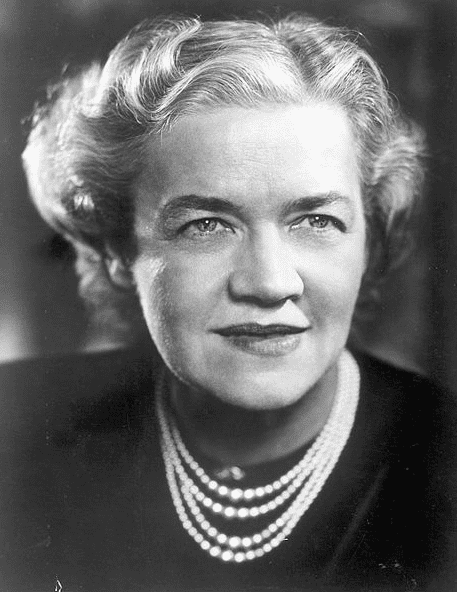
Born in 1897 in Skowhegan, Maine – where she was to die 97 eventful years later – Smith had a number of jobs as a young woman, including school teacher, telephone operator, and office worker. Her path turned toward politics in 1930 when she married Maine politician Clyde Smith, serving as his secretary while he was a member of the U.S. House of Representatives.
Their lives suffered a dramatic change when Clyde suffered a major heart attack; before dying on 8 April 1940 he called upon his constituents to elect his wife as his replacement – and they did, sending her to Congress less than two months later, on June 3.
Thus began a political career of distinction for Margaret Smith. She was Maine’s first female member of the House of Representatives, just as she became Maine’s first female senator. As already mentioned, she was the first woman in the nation’s history elected to both chambers of Congress.
In addition, she was the first woman to have her name placed in nomination for president during a major party convention, having that honor during the Republican Convention of 1964. From 1967 to 1972 Smith served as the first female chair of the Senate Republican Conference. She served in the U.S. Senate for 24 years, holding the record as longest-serving woman senator until finally surpassed by Senator Barbara Mikulski in 2011.
Along with the support and admiration of her constituents and the respect of her congressional peers, Smith was awarded the Presidential Medal of Freedom in 1989 by President George H.W. Bush. In 2007 the U.S. Postal Service issued a stamp in her honor, including her as part of its “Distinguished Americans” series.
The following four newspaper articles are about Smith’s historic election to the U.S. Senate. The first article is a news report of her election victory, and the other three are editorials commenting on her election and her qualities. Note the repeated references to her being the first woman elected to the U.S. Senate “on her own merits.”
Smith was not the first woman elected to the Senate in the nation’s history – that distinction belongs to Hattie Caraway, who was elected in 1932. However, before being elected Caraway had first been appointed to her Senate seat by the governor of Arkansas when her husband, Senator Thaddeus H. Caraway, died. Although Smith’s political career likewise began with the death of her own husband, the following editorials place great significance on the fact that no one appointed Smith to her Senate seat before she won it outright in a fair and open election.
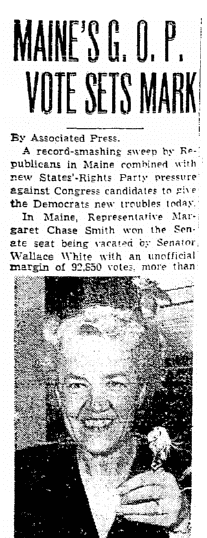
Here is a transcription of this article:
Maine’s G.O.P. Vote Sets Mark
By Associated Press.
A record-smashing sweep by Republicans in Maine combined with new States’-Rights Party pressure against Congress [i.e., congressional] candidates to give the Democrats new troubles today.
In Maine, Representative Margaret Chase Smith won the Senate seat being vacated by Senator Wallace White with an unofficial margin of 92,850 votes, more than 10,000 greater than the record G.O.P. victory margin set in the 1928 governor’s race.
Mrs. Smith immediately tabbed the outcome as “the forerunner of a great Republican national victory.”
With this to worry about, regular Democrats also were faced with new pressure by states’-rights supporters to get Dixie Senate and Congress nominees to come out against the Truman-Barkley ticket.
The Republican victory in Maine put Mrs. Margaret Chase Smith in the Senate as the first of her sex to win a six-year term without benefit of previous appointment. The victory was expected.
Gov. Thomas E. Dewey called the thumping victory in Maine “very gratifying.” The G.O.P. presidential nominee expressed hope the victory would “be taken as a stimulus to even more intensive work by Republicans throughout the country.”
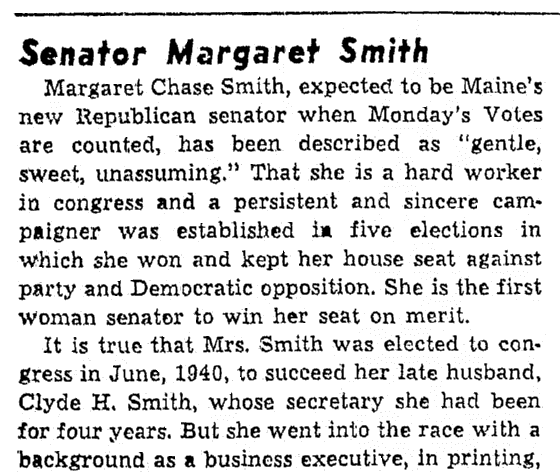
Here is a transcription of this article:
Senator Margaret Smith
Margaret Chase Smith, expected to be Maine’s new Republican senator when Monday’s votes are counted, has been described as “gentle, sweet, unassuming.” That she is a hard worker in Congress and a persistent and sincere campaigner was established in five elections in which she won and kept her House seat against party and Democratic opposition. She is the first woman senator to win her seat on merit.
It is true that Mrs. Smith was elected to Congress in June 1940 to succeed her late husband, Clyde H. Smith, whose secretary she had been for four years. But she went into the race with a background as a business executive, in printing, publishing, telephone and woolen industries. And she did not have then, and has not had since, political machine support.
Two Democratic women senators who preceded her did not have her record of independence. Mrs. Hattie Caraway was appointed to succeed her husband, and elected with the support of Huey Long – whose chief idea was to annoy Majority Leader Joe T. Robinson of Arkansas. Mrs. Long was appointed to finish the term of her assassinated husband.
In the Republican primary this year, Mrs. Smith got more votes for the Senate than her three opponents combined. Two of them were a governor and an ex-governor, both millionaires, whose campaigns were based on assailing “That Woman.” Her record is more liberal than that of the retiring senator, Wallace White; her views more international in scope and her attitude toward labor friendly but firm. She did not campaign either against Mr. Truman or the late Mr. Roosevelt.
Mrs. Smith’s courage and character were shown in the House, where she served on the Armed Services Committee but was barred from Appropriations by Chairman John Taber despite seniority rating over several male members. Her sensible and moderate influence will be greater in the Senate.
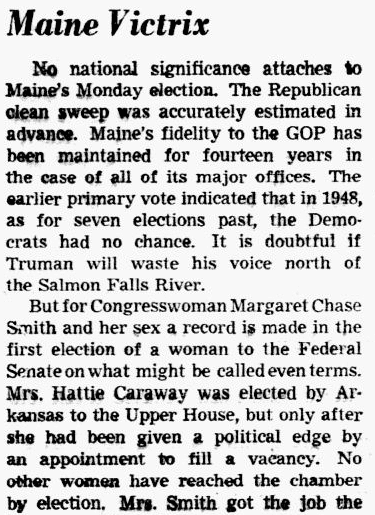
Here is a transcription of this article:
Maine Victrix
No national significance attaches to Maine’s Monday election. The Republican clean sweep was accurately estimated in advance. Maine’s fidelity to the GOP has been maintained for fourteen years in the case of all of its major offices. The earlier primary vote indicated that in 1948, as for seven elections past, the Democrats had no chance. It is doubtful if Truman will waste his voice north of the Salmon Falls River.
But for Congresswoman Margaret Chase Smith and her sex a record is made in the first election of a woman to the Federal Senate on what might be called even terms. Mrs. Hattie Caraway was elected by Arkansas to the Upper House, but only after she had been given a political edge by an appointment to fill a vacancy. No other women have reached the chamber by election. Mrs. Smith got the job the hard way. Only it proved easy.
Maine’s new senator is a 50-year-old widow, an ex-schoolteacher converted into a successful businesswoman, and with five terms in Congress as her background for the new job. If her confident forecast of a GOP victory in November is sustained, the gal in whom State of Mainers place so implicit a confidence as to give her landslide victories in both primary and election may wield considerable influence.
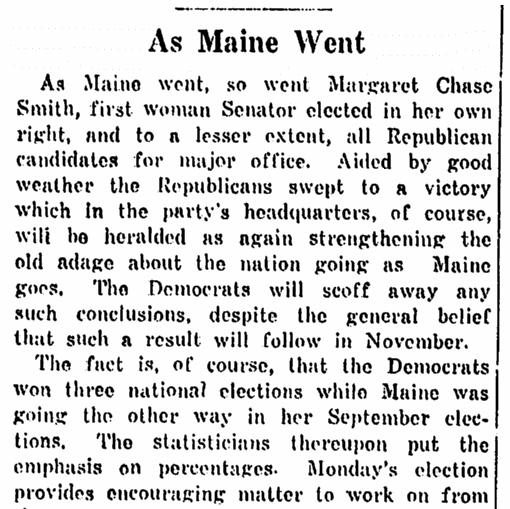
Here is a transcription of this article:
As Maine Went
As Maine went, so went Margaret Chase Smith, first woman senator elected in her own right, and to a lesser extent, all Republican candidates for major office. Aided by good weather the Republicans swept to a victory which in the party’s headquarters, of course, will be heralded as again strengthening the old adage about the nation going as Maine goes… Margaret Chase Smith won handsomely over her Democratic opponent, and her record during her four terms in the House of Representatives warrants it. She belongs to the more liberal element of the Republican Party, is hardworking and intelligent and should make a real contribution to enlightened legislation in the Senate.
Note: An online collection of newspapers, such as GenealogyBank’s Historical Newspaper Archives, is not only a great way to learn about the lives of your ancestors – the old newspaper articles also help you understand American history and the times your ancestors lived in, and the news they talked about and read in their local papers.
Related Articles:
- Victoria Claflin Woodhull – the 1st Woman to Run for U.S. President
- Nellie Tayloe Ross: the Nation’s First Female Governor
- Historic Milestone: Hattie Caraway 1st Woman Elected to the U.S. Senate
- Antonia Novello: First Woman, and Hispanic, Surgeon General
- 11 March 1993: Janet Reno Becomes 1st Female U.S. Attorney General
